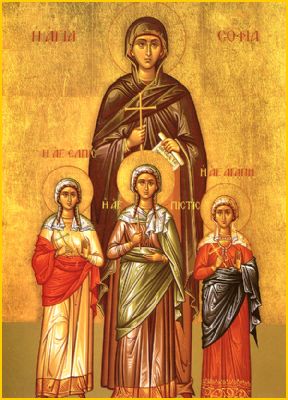|
|||
|---|---|---|---|
| This weekly bulletin insert complements the curriculum published by the Department of Christian Education of the Orthodox Church in America. This and many other Christian Education resources are available at http://dce.oca.org. | |||

The Church remembers Saint Sophia and her martyred daughters Faith, Hope and Love. They lived in Rome, and spoke openly about their Christian faith even in a time of severe persecutions. The four family members were arrested and ordered to worship the goddess Artemis, but refused. Sophia, a widow, encouraged the girls (not yet in their teens) to stay strong and face whatever might come. The girls were tortured and killed. Sophia, in pain from torture, was allowed to bury their broken bodies. She prayed over the graves in deepest grief, then died, anticipating a reunion with her daughters in God's Kingdom. Sophia had taught her family not to be afraid of proclaiming the faith. Their willingness to die rather than renounce Jesus Christ surely encouraged fellow believers to do the same. Their life and death were a reaching out to others. In the movie "The Kids Are All Right" there is no reaching out; everything is turned inward. The story is of a lesbian couple, Nic and Jules, who have two teenage children, a boy and a girl, both by the same sperm donor. When Nic questions the boy, Laser, about a friend she doesn't like, her words show that she is raising the son to look at everything in terms of personal benefit. She asks him what he "gets" from the friendship. She tells Laser that the friend is undesirable because he seems "untended." It doesn't occur to her that she and her family might reach out to him, and have a part in "tending" him. Laser and his sister Joni want to meet their biological father, Paul. They secretly arrange a meeting, and over time develop a relationship with him. Finally they bring him home to meet Nic and Jules. It seems that Paul may belatedly have a place in their lives, but this possibility is ruined when he and Jules begin an affair. Nic, who is terrified of losing her primary place in the children's lives as they get closer to Paul, seizes the chance to banish him from their lives. On his next visit, she angrily calls him an "interloper" as she slams the door in his face, telling him never to come back.
To Nic, Paul is an interloper because he threatens her desire to shut the world out and enclose her family safely behind that door she slams on him. But he is also Joni and Laser's father, and she will never really be able to shut that fact out. Saint Sophia didn't try to shut the world out. She taught her family members to face the world, and to be concerned for others' salvation as well as their own. She urged them not to fear suffering for Christ. That is the only way to raise truly Christian children: by readying them to put Christ first, not by trying to shut the world out or, certainly, by trying to deny biological truth. That is also the only way it's possible to feel that the kids really are all right. |
|||
